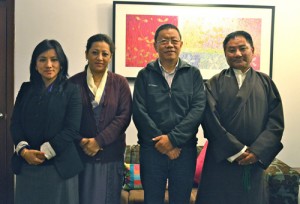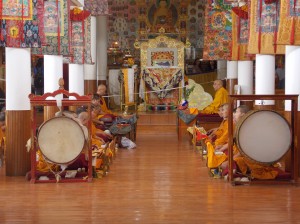As the Northeast zone delegation of the Tibetan All-Indian Lobby Campaign leaves Sikkim after six days of meetings with various state ministers and MPs, much political backing and moral support is gathered for the on-going cause of freedom and justice to Tibet.
In December 2012, The Tibetan Parliament-in-Exile announced the All-India Lobbying Campaign as an attempt to create wider support from Indian leaders and people, while also urging for immediate global intervention to end the crisis inside Tibet. Since the beginning of January, delegations of MPs from the Tibetan Government-in-exile have been touring the East, North, and South of India as to shed light on the grievous situation within Tibet and to garner both civil and political support for the cause. As a member of the Northeast zone delegation put it: ‘A number of governments around the world have openly pressured the Chinese government on the current crises in Tibet. We appeal to the Central and State governments in India to engage in similar urgent diplomatic action’.
The campaign has primarily consisted of meeting Indian politicians, organising protests and prayers, and holding press conferences. During the first leg of the campaign, the Tibetan envoys gathered much political support from Indian politicians from both state-wide parties, such as the Congress Party and the opposing Bharatiya Janata Party (India’s second largest political party in terms of representationas)as well as smaller state-centric parties.
The three-member Tibetan Parliamentary Northeast zone delegation, led by former speaker Pema Jugney, reached Sikkim state capital Gangtok on May 3, and commenced a six day lobbying campaign, meeting both senior ministers of the state, and members of the Indian parliament. Dhardon Sharling, a member of the delegation, termed the meetings a success as the state leaders ‘spoke of the historical and cultural ties between Sikkim […] and Tibet and expressed solidarity and steadfast support for the Tibetan political movement’. A key point in the campaign was the ongoing wave of self-immolations. In a press conference, Mr. Jugney said they have ‘raised a clarion call for freedom inside Tibet and the return of HH the Dalai Lama to Tibet’. Moreover, on May 7, the delegation led a mass candle light vigil in Gangtok as to show solidarity with the self-immolators.
Political leaders from across party lines in the northeast Indian state of Assam have come out in strong support of finding a lasting resolution for Tibet following lobbying efforts by the exile Tibetan parliamentarians.
And in Arunachal Pradesh, which shares its borders with Tibet, political leaders have come out in support for the resolution of the ongoing crisis inside Tibet. The Tibetan MPs met the Hon Chief Minister Nabam Tuku in the state capital Itanagar during their five-day lobbying effort, and he
expressed solidarity with the aspirations of the Tibetan people inside Tibet and said he feels connected to Tibet socially and culturally. “The chief minister expressed admiration for the exile Tibetan administration and the exile Tibetans’ perseverance that persists despite all odds,” Tibetan MP Dhardon Sharling, who is a member of the delegation said.
On the final leg of the tour, top leaders of the northeast Indian sate of Meghalaya met the Tibetan parliamentary delegation and pledged political support to resolve the Tibetan issue. His Excellency the Governor of Meghalaya, Ranjit Shekhar Mooshahary said that Tibetans “must never lose hope…..Hope is what will keep you all going and victory will be an eventuality”. Deputy Chief Minister of the State, Rowell Lingdo, condemned the “atrocious policies of the Chinese Government” and said that China must ”realise, respect and respond to the true aspirations of the Tibetan people and the Tibetan leadership’s call for dialogue to resolve the crisis.”





 Print
Print Email
Email